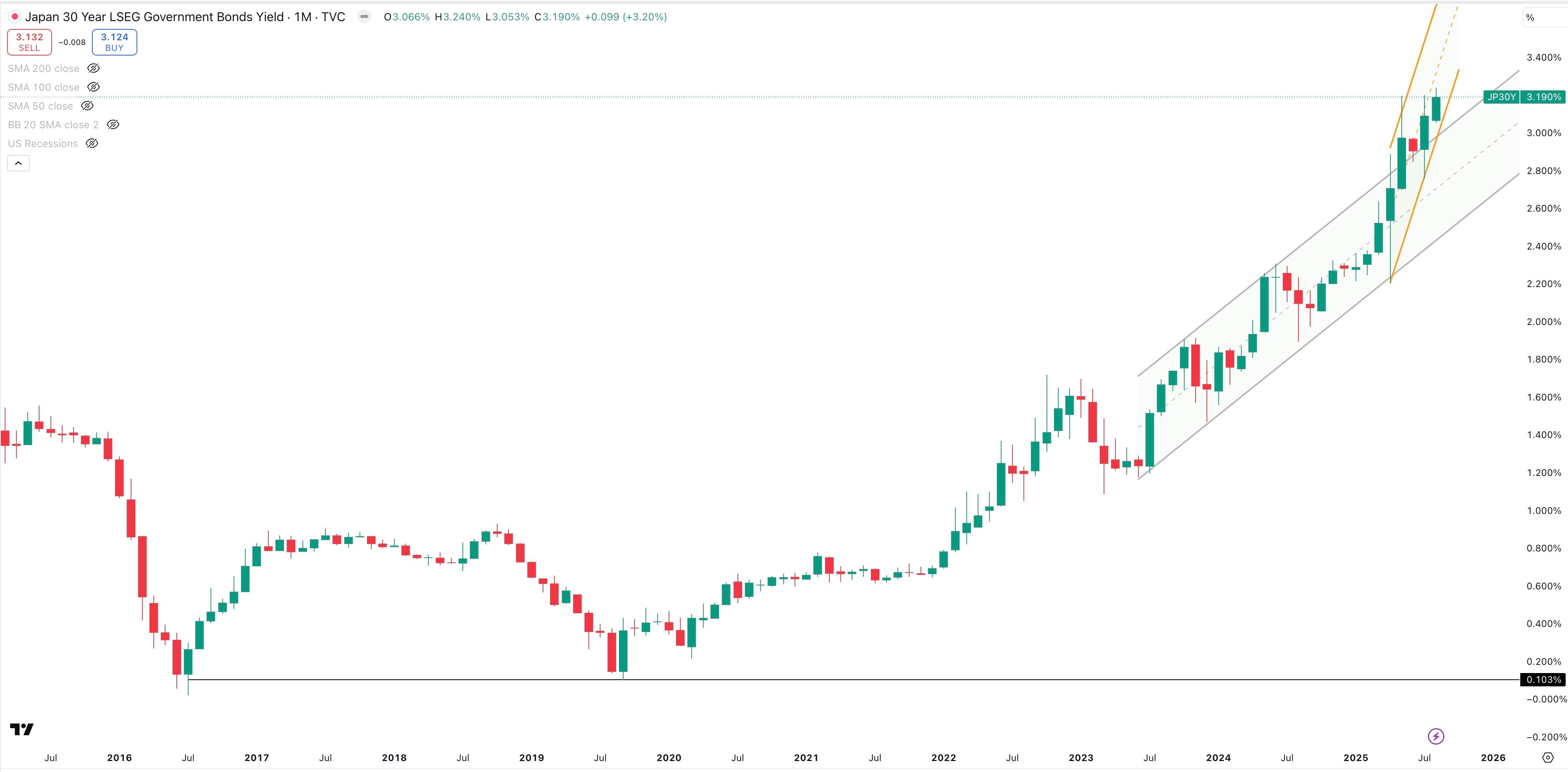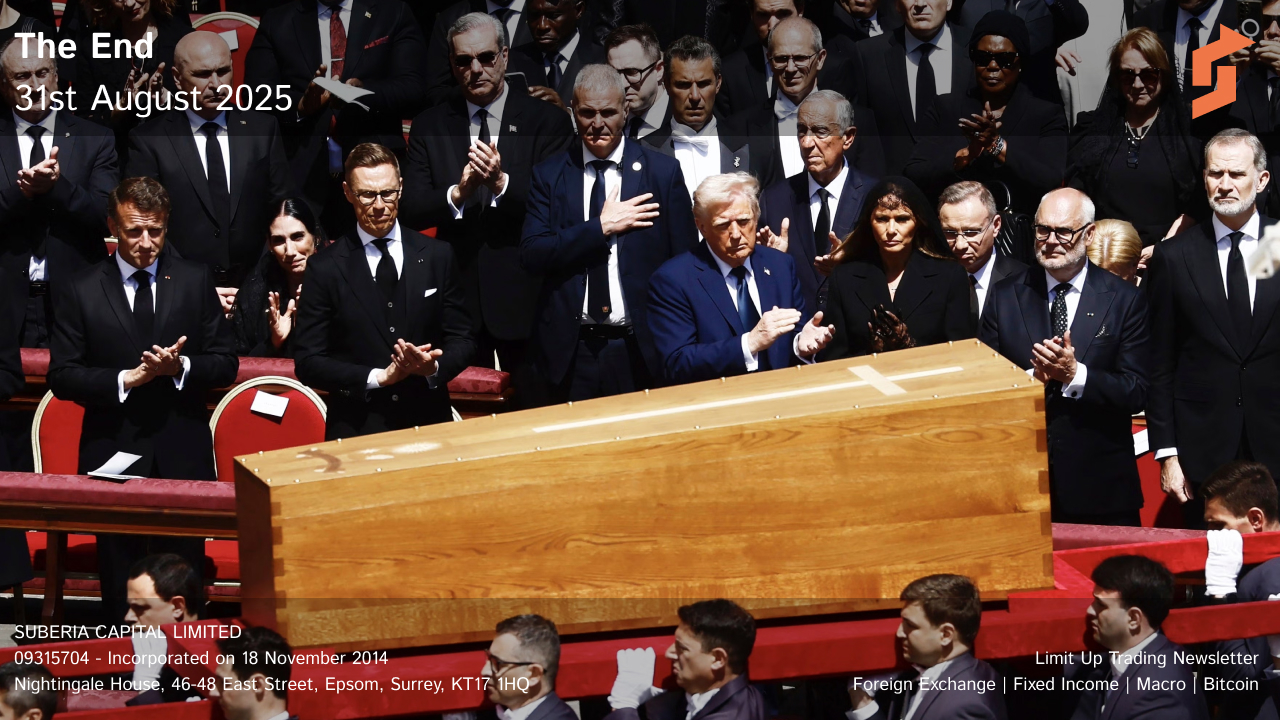The End
Podcasts | Daily LinkedIn | Weekly LinkedIn | Bitcoin for Business
Overnight

US Core PCE July 2025

University of Michigan Consumer Sentiment August 2025
US monthly PCE exactly as expected (statistically incredibly unlikely). Even the Atlanta FED's going for higher GDP.
The stock markets were basically NVIDIA where good news was bad news.
- Revenue: $46.7B, up 6% QoQ, 56% YoY, slightly above $46.06B estimates.
- EPS: Non-GAAP $1.05, beat $1.01 estimates. GAAP $1.08.
- Data Center: Up 17% QoQ, but missed some analyst targets.
- Guidance: Q3 revenue $54B (±2%), no China H20 sales assumed.
- NVIDIA (NVDA): Dropped 2.3% after-hours Thursday post-earnings due to China concerns and softer data centre revenue, despite the beat. Friday saw further declines (2-3%) amid tech sector weakness and pre-holiday trading.
- Marvell (MRVL): Plunged ~14% pre-market after in-line earnings and weak data centre revenue. Continued to slide Friday, reflecting AI sector scrutiny post-NVIDIA.
- Alibaba (BABA): Rose ~4.4% early Friday on AI chip news and earnings beat, bucking tech sell-off.
A down day but last day in the month is always on the cards.

US Equities
S&P 500 ends lower as Dell and Nvidia drop [Reuters]
Breaking
Fed's Waller sees rate cuts over next 3-6 months, starting in September [Reuters]
A 3rd Property!? Pulte Drops New Criminal Referral On Lisa Cook As Mortgage Scandal Widens [Zerohedge]
Indian rupee tumbles past 88 to all-time low on US tariff hit; central bank intervenes [Reuters]
Trump hits small packages with fresh tariffs as duty-free exemption ends [FT]
Exclusive New Zealand Considers Relaxing Home-Buying Ban for Rich Foreigners[Bloomberg]
The End
The image above is of course of President Trump attending Pope Francis' funeral earlier this year. There is an entity that thinks it may have this experience soon. Outwardly, and especially to the global investment community, it's trusted and independent. It's the FED.

Despite it's good name, The FED has had quite the chequered history as the US Treasury's henchman.
- 1913: Federal Reserve Act signed into law by President Woodrow Wilson, establishing the Fed as the U.S. central bank to stabilise the financial system after banking panics.
- Disagreement: Strong Senate opposition from progressives like Robert La Follette, who argued the Fed gave too much power to private bankers, and conservatives wary of centralised control.
- 1929-1933: Great Depression begins; Fed criticised for tight monetary policy, exacerbating economic collapse.
- Disagreement: President Herbert Hoover clashed with the Fed, believing its inaction worsened the crisis, though he lacked authority to intervene directly.
- 1933: Banking Act of 1933 (Glass-Steagall) strengthens Fed’s regulatory powers, creates FDIC.
- Disagreement: Some senators, like Carter Glass, pushed for stronger separation of commercial and investment banking, facing resistance from banking interests influencing Senate debates.
- 1935: Banking Act of 1935 restructures Fed, centralising power in the Board of Governors and reducing regional bank influence.
- Disagreement: Senate banking committee members debated Fed independence, with some arguing for more government oversight, reflecting tensions with Roosevelt administration.
- 1951: Treasury-Fed Accord ends Fed’s obligation to monetise government debt at low interest rates, restoring monetary policy independence.
- Disagreement: President Harry Truman pressured Fed to keep rates low to finance Korean War debt, leading to public disputes with Fed Chairman Thomas McCabe.
- 1978: Humphrey-Hawkins Act mandates Fed to pursue maximum employment and stable prices, formalising dual mandate.
- Disagreement: Senate debates centred on balancing inflation control with job growth, with some senators pushing for stricter inflation targets.
- 1979-1987: Fed Chairman Paul Volcker raises interest rates to combat stagflation, causing recession but curbing inflation.
- Disagreement: President Ronald Reagan criticised Volcker’s tight policies, fearing political fallout from recession; tensions eased as economy recovered.
- 2008-2009: Global Financial Crisis; Fed under Ben Bernanke implements quantitative easing (QE) and bailouts.
- Disagreement: President George W. Bush and Senate faced public backlash over bailouts; senators like Bernie Sanders criticised Fed’s secrecy and Wall Street favouritism.
- 2010: Dodd-Frank Act increases Fed oversight and creates Consumer Financial Protection Bureau.
- Disagreement: Senate Republicans, like Richard Shelby, opposed expanded Fed regulation, arguing it stifled economic growth; President Obama pushed for stronger reforms.
- 2018-2020: Fed under Jerome Powell raises rates, then cuts them amid trade tensions and COVID-19.
- 2020-2022: Fed maintains near-zero rates and massive QE during COVID-19 recovery.
- Disagreement: Some Senate Republicans, like Rand Paul, criticised Fed for fuelling inflation, while President Joe Biden supported Powell’s reappointment despite progressive pushback.
- 2022-2025: Fed aggressively hikes rates to combat 40-year-high inflation, peaking at 9.1% in June 2022.
- Disagreement: President Biden faced Senate pressure from progressives like Elizabeth Warren, who argued rate hikes hurt workers, while conservatives demanded tougher inflation measures.
If the FED really stands in Trump's way in an hour of financial desperation, could Trump/ Congress kill the FED. Theoretically it could by vote of Congress, and obviously this would have massive implications for both investors and Treasury's ability to service it's debt.
That would be a step too far for Congress, but Trump could push the envelope. In fact this weekend:
Trump Tariffs Ruled Illegal by Federal Appeals Court [Bloomberg]
Bessent Warns of US ‘Embarrassment’ If Tariffs Ruled Illegal [Bloomberg]
And's here's Vance, in plain site, talking about ending the FED:
Vance on undermining the Federal Reserve: "I don't think we allow bureaucrats to make decisions about monetary policy and interest rates without any input from the people that were elected to serve the American people...POTUS is much better able to make these determinations." pic.twitter.com/Na1801vizU
— The Bulwark (@BulwarkOnline) August 28, 2025
Precious Metals / Commodities
Gold breaks out, nearing the all time daily close.

And Silver hits $40.

Oil attempting to rollover in the bear flag, and we're beginning to see commodity houses calling for price to hit $50.

Bitcoin (& Crypto)
Nerves jangling for late Bitcoin investors as the sell-off intensifies. Will be a whole crowd who thought price would never go below 100k again. Along with those following the BTC/global M2 higher trade, and those believing everything that Trump's sons say.

CRE / Banks / CLOs
 |
 |
 |
Hundreds Of Landlords Appeal Assessments Of Boston Offices, But Few Succeed [BisNow]
Investors pile billions into New York office market [FT]
CMBS Pioneer Ethan Penner On CRE's 'Breathtaking' Losses [BisNow]
A lot of high profile haircuts, now impacting councils, municipalities etc. But investors still want a slice of the action.United States

US Economic Indicators
So we're not to trust the official data, according to Trump, and PCE came in identical with expectations. And GDP rose more than expected with a stable, full strength labour market. You've have thought that Powell wrote the script.
But USD, via DXY, heading for a third recent test of 15 year support.

China

China Economic Indicators
Nothing to crunch this week but PMIs are out on Sunday.
Nine months of the Offshore Yuan strengthening. If it goes much higher then the PBoC is going to have to take action, despite them saying last week that further rate cuts weren't needed.

Japan

Japan Economic Indicators
Am I the only one thinking the Japanese CPI is heading much lower? Housing Starts down 10% from a year earlier, 9 million house empty in Japan, Construction Orders down 19% YoY, monthly Industrial Production falls1.6%. You'd get good odds on the next direction of interest rates being down.

Europe

EU Economic Indicators
Germany is the sick man of Europe. Unthinkable even 5 years ago. What happens to GDP if migrants stop coming in? The only way is down.
ECB rate hold rhetoric helping to keep the Euro firm, and in a bear flag.

Germany 10 Year Bond Yield Monthly
United Kingdom

UK Economic Indicators
No data this weak but Gilt yields show a market with a big move about to happen. Some sort of fiscal stability needs to happen immediately as Labour economic policies make no sense whatsoever.
As a measure of how poor the UK Govt is regarded by financial markets, Liz Truss is becoming a bit of a thought leader!
Bring back the lettuce.

UK 10 Year Government Bond Yield Monthly
Canada

Canada Economic Indicators
Central bankers looking in the wrong direction as Mr Macklem worries about tariff-driven inflation, but the country now heading for recession as GDP tanks. Change of migration tactics quickly reverse the illusion that things are OK economically.
- He emphasised the importance of international cooperation among central banks, noting the increasing global risks and economic uncertainties, particularly with high interest rates and slowing growth.
- Macklem highlighted the Bank of Canada's focus on improving economic modelling to better track supply disruptions and their impact on inflation, distinguishing between demand-driven and input-cost-driven inflation.
- He mentioned that the Bank would not revisit its 2% inflation target during the upcoming 2026 monetary policy framework review, citing its proven effectiveness in maintaining price stability.
- He also noted that steep new U.S. tariffs and unpredictable U.S. policy have reduced economic efficiency and increased uncertainty, potentially adding upward pressure on inflation.
USD/CAD now looking like a bear flag, price returning to the scene of the crime. Could be a big drop coming below 1.3550.

Canadian luxury retailer SSENSE to file for bankruptcy protection [BBC]
Australia

Australia Economic Indicators
The RBA Minutes on Tuesday gave the impression that all voting members are keen to cut rates yet Wednesday brought a big increase in CPI. There was no guidance, unlike Bank of England's recent policy statement. Being data dependent means you have no strategy so no doubt all those dovish RBA members will suddenly become hawks.
Why interest rates are unlikely to fall much further [AFR]
Also mirroring the FED
Australia Housing Dysfunction Mirrored in Central Bank’s Blowout Rebuild [Bloomberg]
The Aussie tagged the 15 year downtrend at 0.6550. Those candles are now hanging around resistance. Time to buy the break if we get one (would mean USD significantly lower).

What's Next?
It's going to be a quiet start for markets next week with Labour Day in the US and Canada. The drama will be on Friday with Nonfarm payroll already expected to be low by recent prints. Watch for revisions to prior data points.
This Week's Important Economic Indicators [London time]
![This Week's Important Economic Indicators [London time]](https://vip.suberia.capital/hs-fs/hubfs/31082025/indicators.jpg?width=658&height=746&name=indicators.jpg)
 Ian Reynolds
Ian Reynolds

.jpg?width=352&name=Limit%20Up%20Newsletter%20Cover%20(66).jpg)

.jpg?width=352&name=Limit%20Up%20Newsletter%20Cover%20(81).jpg)